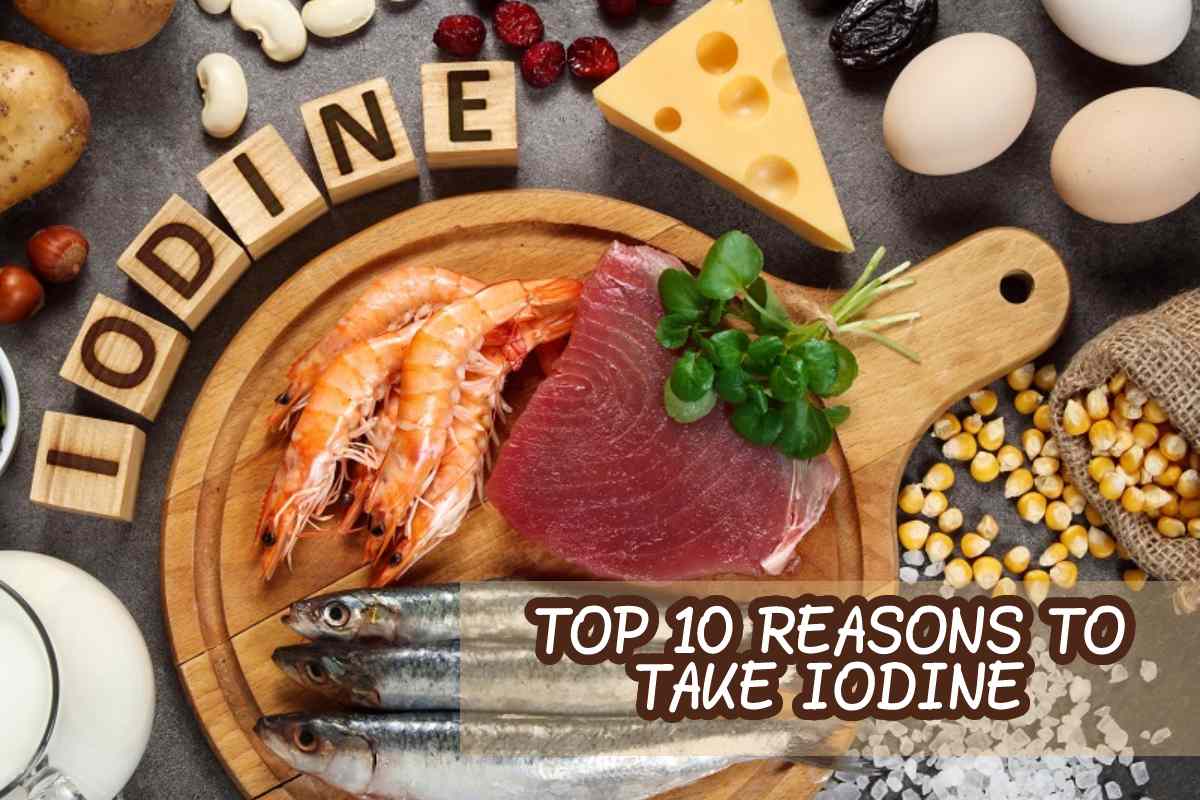Table of Contents
What is iodine?
Iodine (or iodide), is an essential mineral that is naturally present in the earth’s soil and oceans and transferred to land and sea vegetables as they grow. Because iodine deficiency is one of the most common causes of preventable mental retardation worldwide, iodine has also systematically been added to table salt (iodized salt) since the 1940s.
What are the Health Benefits of iodine?
It’s critical to get enough iodine in the diet because it is required for the production of thyroid hormones. In turn, these hormones are required throughout life for normal growth, neurological development, and metabolism, and are also needed for proper bone and brain development during pregnancy and infancy. An insufficient intake of iodine hinders the body’s ability to produce an adequate amount of thyroid hormones, leading to hypothyroidism (or “underactive thyroid”). Iodine deficiency also causes a range of other health conditions of different degrees of severity. Supplemental iodine can help make up for low iodine in the diet.
What are Iodine Supplements used for? Let’s Explore the Top 10 uses –
1. Promoting Thyroid Health
Because low iodine intake affects thyroid function, iodine supplementation can help regulate the production of thyroid hormones. Iodine supplements can also help relieve iodine deficiency symptoms such as fatigue, increased sensitivity to cold, constipation, dry skin, sluggish metabolism, weight gain, puffy face, hoarseness (caused by goiter), brain fog, and muscle weakness. While some people can have an intolerance to iodine, it is not categorized as an allergy since iodine is essential to human health.
2. Reducing Risk of Goiter
A goiter is an enlarged thyroid – the most common cause of which is iodine deficiency, but can also be the result of hypo – or hyperthyroidism (low thyroid hormone production, or excessive production). Iodine supplements can help restore your iodine status and prevent the development of goiters, as well as in many cases, reverse goiters.
3. Managing Hyperthyroidism
An overactive thyroid can be just as problematic as an underactive one and cause symptoms such as weight loss, rapid heartbeat, irregular heartbeat, palpitations, increased appetite, nervousness, anxiety, and irritability. In hyperthyroidism, radioactive iodine may be recommended to destroy extra thyroid tissue and reduce the overproduction of thyroid hormones. Radioactive iodine is not sold as a supplement – it is prescribed by your doctor.
4. Menopause
There is a higher incidence of hypothyroidism in menopausal women, likely due to iodine deficiency as a result of inadequate iodine intake or a reduced iodine uptake ability. Iodine supplements can help stabilize thyroid hormones, and in turn, relieve the symptoms associated with low thyroid – most notably, sluggish metabolism, unexplained weight gain, and fatigue.
5. Boost Immunity
Iodine is required for the proper function of all organ systems, including that of the immune system. Further, it’s well-known that bacteria, viruses, or other microorganisms cannot survive or adapt to an iodine-rich environment, thus, an adequate level of thyroid hormones in the system, naturally helps keep pathogens in check.
6. Brain and Nerve Development During Pregnancy/Boosting Cognitive Function
Studies have shown that babies whose birth mothers had an iodine deficiency during pregnancy were at increased risk of low IQ and other intellectual delays. Pregnant and lactating mothers who have very restricted diets during pregnancy should have their iodine levels checked, and use an iodine supplement if their levels are low.
7. Promote Healthy Hair
Low thyroid production is associated with hair loss. This is why iodine supplements can be used to stimulate the thyroid, and in turn, boost hair growth, strength, and resilience. In addition, because of iodine’s antibacterial properties, supplementation can also help fight potential scalp infections, which clears the follicles and roots and further boosts hair growth.
8. Treatment for Fibrocystic Breasts
Research has shown that iodine supplementation – most notably in those with low iodine – may improve the symptoms associated with fibrocystic breast disease (i.e. breast tenderness, especially before menstruation).
9. Disinfecting Wounds/Treating Infections
Iodine is a well-known antiseptic and is used topically to prevent and treat infections that may develop as a result of minor scrapes, cuts, and burns. Some of the other benefits of topical iodine on the skin include accelerating skin healing in wounds, pressure sores, and surgical incisions
10. Protection in Cases of Nuclear Accidents
A potassium iodine supplement is recommended when there is radiation exposure to reduce the amount of radioactive iodine that the thyroid can accumulate. This helps reduce the risk of thyroid dysfunction and cancer down the road.
Disclaimer: The information in this article is intended for educational and informational purposes only and should not be considered as a substitute for medical advice. Please consult your practitioner prior to taking herbs or nutritional supplements.
Author Bio
Roos Jonsin is a Canadian naturopath and researcher dedicated to helping people live healthier lives through education about vitamins, herbs, and nutritional supplements. Roos also consults with suppliers and manufacturers with product development and marketing. National Nutrition is Canada’s leading health & nutritional supplements store, also voted as the Best Health Food Store in Canada by the experts at Canadian Health Food Association.
Email: roos.jonsin.nd@nationalnutrition.ca
Website: https://www.nationalnutrition.ca/

